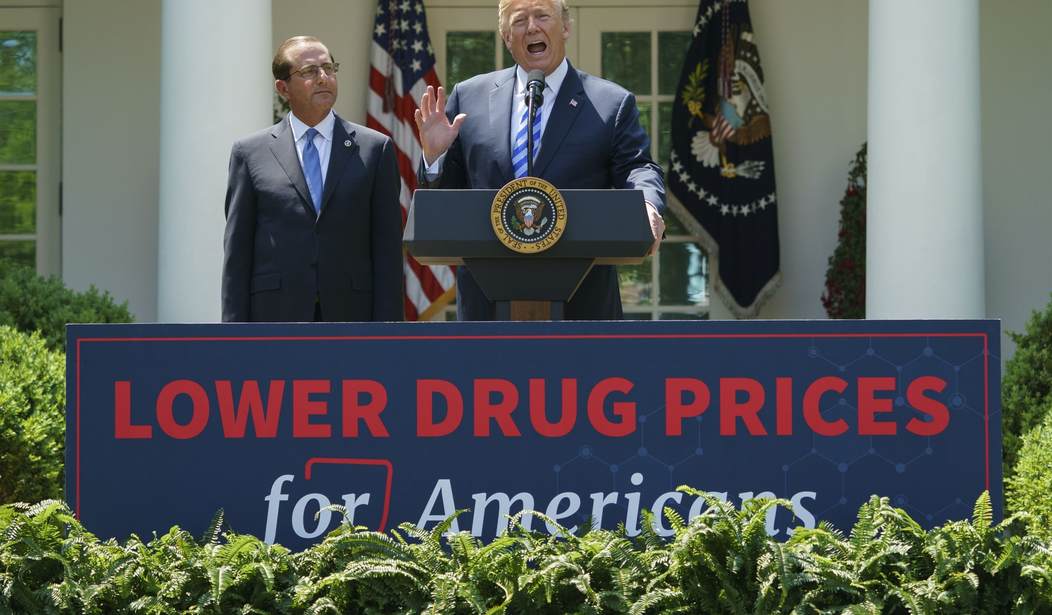AARP claims to represent the interests of senior citizens across the United States, so watching the non-profit advocate for keeping prescription drug prices high has been an odd spectacle indeed.
David Certner, AARP's legislative policy director, recently released a letter urging Health and Human Services (HHS) to keep a special-interest loophole in the Anti-Kickback Statute, a law passed by Congress in 1972 to crack down on waste, fraud, and abuse within the healthcare industry.
At the time of the statute’s creation, middlemen known as Pharmacy Benefit Managers (PBMs) were exempted from its punitive kickback restrictions because since PBMs were created to obtain rebates that would be passed onto consumers, their kickbacks were thought to be good ones.
However, fast forward four decades and it is clear that these high hopes have not come to terms with reality. According to HHS, “the average difference between the list price of a drug and the net price after a rebate is 26 to 30 percent” and yet the rebates PBMs receive are “typically not used to reduce patients’ cost sharing for a particular drug.”
The Trump administration’s newly-proposed rule would fix this by ensuring that the cost savings from the drug manufacturers’ rebates goes straight into consumers’ pockets rather than into the hands of the PBM middlemen that have no financial interest in ensuring the money trickles downwards. However, despite the fact that its members would receive significant cost-savings, AARP is leading the fight in preventing the proposed rule-change from going into effect.
Why is AARP so invested in defending an exemption to the Anti-Kickback Statute? When it comes to this supposed non-profit, the answer is: “follow the money.”
In 2016, AARP made $880 million from royalties, much of it from none other than the PBMs themselves. Experts cite, in particular, a lucrative partnership with UnitedHealth Group, which owns a PBM called Optum Rx, as driving the AARP's eyebrow-raising lobbying efforts. Of a total 2016 revenue of $1.6 billion, $627 million of AARP’s funds came from its UnitedHealth partnership.
Recommended
Is this just business as usual for a large non-profit? Not really. Paul Cornell, the CEO of an AARP competitor, American Seniors Association, told the Daily Caller that the unholy alliance between AARP and UnitedHealth is profiteering at its finest.
“They coordinate to make additional profits when AARP plays itself out to be an organization to benefit and help seniors save money, so it’s a big farce,” Cornell said. “It’s almost criminal what the two companies do.”
AARP's self-interested arguments on the proposal to eliminate its loophole to the Anti-Kickback statute don't stand up to basic economic analysis. The group says in its comments that forcing the PBMs to pass rebates it receives from drug companies directly on to consumers would only "shift costs from one part of the system to another." However, currently, the rebates are a huge source of revenue for PBMs. The PBMs secure incredible terms on purchasing drugs, only to keep the profits for themselves. Meanwhile, patients continue to pay higher and higher prices.
The PBMs essentially hijacked a weakness in the incentive structure for the Medicare Part D program, siphoning profits from a market structure that was supposed to benefit consumers. In a typical market, prices go down and quality goes up over time, due to increases in productivity and innovation. Thanks to its market-oriented design, that's been truer of the Medicare Part D program than most any other part of the health care sector. The program actually came in 40% under budget in its first decade of existence. However, the rapid consolidation of the PBMs has perverted the market, creating an imbalance that is driving prices higher, not lower, despite the added efficiencies.
"AARP, in your relationship with mega PBM Optum, you’ve defined yourself as being for kickbacks that are costing the American patient money at the pharmacy counter and in hospitals," Marion Mass, a pediatrician and co-founder of patient advocacy group Practicing Physicians of America, said. "You don’t stand for America, you stand for yourselves.”
The main struggle in health care policy is to ensure that companies profit by better-serving their customers. The deep level of government intervention in the market is preventing it from happening.
Requiring the PBMs to pass rebates directly to customers is a way of restoring the link between profits and patients to the Part D program. The point of the rebates is to benefit consumers. It's not to enrich PBMs while prices go up. The change will force PBMs to compete by improving service and prices.
While the PBMs are understandably trying to protect their Anti-Kickback loophole because it's profitable for them, AARP's role in all this is very troubling. As a non-profit organization, it's supposed to be advocating on behalf of its members. Allowing an insidious conflict of interest to steer its legislative policy—to the point where it finds itself pleading to protect a loophole—should be fatal to its credibility. The Trump administration is doing the right thing and should continue unabated.

























Join the conversation as a VIP Member